Did you know that the RV park industry is evolving rapidly with new trends like glamping and remote work reshaping customer expectations? Explore how the future of RV parks is adapting to these dynamic changes.
Overview of the Future of RV Parks and Industry Dynamics
- Definition and scope of RV parks and campgrounds: RV parks and campgrounds serve as dedicated spaces for recreational vehicle enthusiasts and campers to stay overnight or longer. They provide essential amenities ranging from basic hookups to full-service resort-style accommodations. These parks vary widely in size and offerings, catering to families, retirees, remote workers, and adventurers alike.
- Current economic cycles impacting the RV industry: The RV industry experiences fluctuating economic cycles that affect both demand and investment in parks. Economic downturns may initially cause uncertainty; however, the industry often demonstrates resilience as consumers seek affordable travel options. Innovative RV park owners adapt to these cycles by evolving their services and marketing, thereby maintaining viability through ups and downs.
- Key trends shaping the future of RV parks: Among the most influential trends are the rise of glamping accommodations, the integration of technology for enhanced reservations, and an increasing population of remote workers requiring connectivity. These elements combine to create fresh opportunities for park owners to diversify their offerings and attract broader demographics.
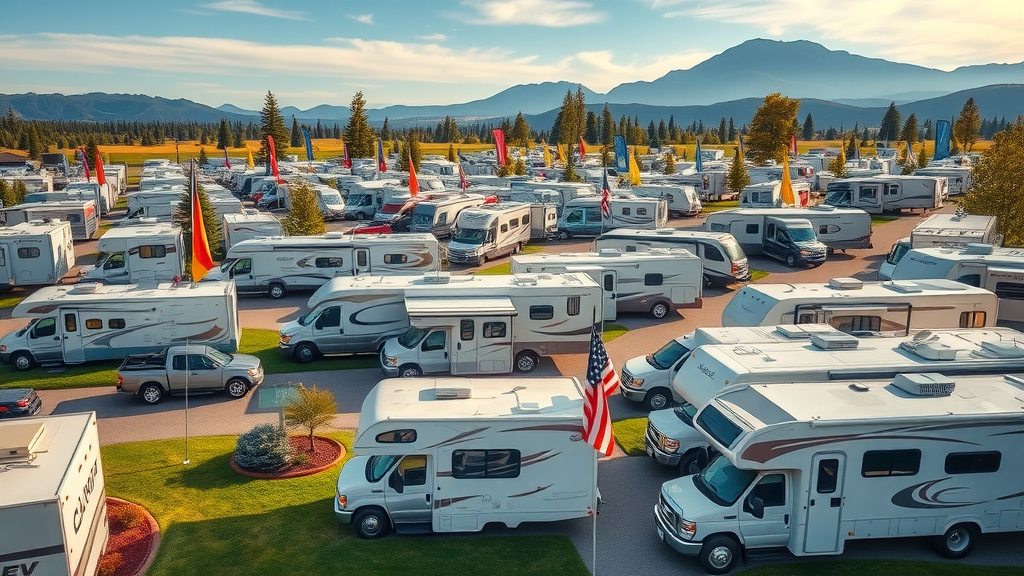
Image: Spacious modern RV park with various RVs, busy yet organized, photorealistic, scenic mountain backdrop, mid-morning sunlight.
Marie Hansen, owner and developer of RVParkSales.com , explains, " The RV park industry goes through up and down cycles, but creative owners find ways to attract guests and thrive despite economic challenges. "
Innovations Driving the Future of RV Parks and Campgrounds
- Introduction of glamping options such as cabins, yurts, and park models: The evolution toward glamping reflects customers’ desire for a mix of outdoor experiences and comfortable accommodations. Unique structures like yurts, cabins, and park models provide inviting alternatives for visitors who do not own RVs but want to immerse themselves in nature without sacrificing comfort.
- Integration of advanced reservation systems and custom websites: Modern RV park owners adopt state-of-the-art booking systems that enable seamless online reservations, real-time availability updates, and improved customer interaction. Custom websites tailored to the specific brand and services of each park increase visibility and conversion rates, fueling revenue growth.
- Enhanced marketing strategies including social media and online presence: Leveraging social media platforms and targeted online campaigns allows parks to engage potential customers more effectively. These digital strategies build community, generate bookings, and respond dynamically to changing consumer behaviors.
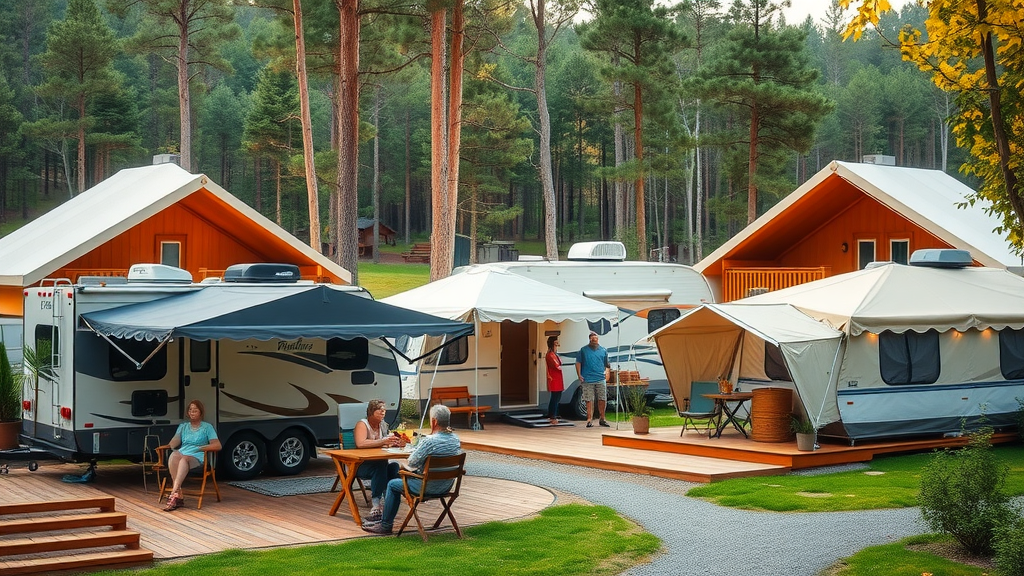
Image: Modern RV park with glamping tents and cabins, photorealistic, lush forest background, natural daylight.
Marie Hansen highlights, " A better reservation system combined with a custom website and strong marketing can significantly increase occupancy and revenue for RV park owners. "

Image: Close-up of a user-friendly online RV reservation system on a tablet, modern tech office background.
The Role of Remote Work in Shaping RV Parks' Future
- Rise of mobile workers seeking connectivity in RV parks: The widespread adoption of remote work has positioned RV parks as attractive destinations for digital nomads. Parks that provide reliable high-speed Internet enable workers to combine productivity with outdoor leisure, expanding the market beyond traditional vacationers.
- Development of community features like clubhouses with high-speed internet: To accommodate these remote workers, many parks now offer communal spaces equipped with fast Wi-Fi, comfortable workstations, and social areas fostering community interaction among travelers.
- Appealing to younger demographics balancing work and outdoor lifestyle: This trend attracts a younger demographic seeking flexible lifestyles. Parks adapt by offering tech-friendly amenities and promoting an active, connected community atmosphere.
How RV Parks Are Adapting to Remote Work Trends
- Creating work-friendly environments within parks: Parks invest in quiet zones, printing services, and ergonomic seating options to facilitate remote work demands.
- Offering amenities that support digital nomads: Charging stations, dedicated conference rooms, and events promoting networking appeal to the needs of this community.
- Marketing strategies targeting remote workers: Advertising channels focus on highlighting technology infrastructure and lifestyle benefits to attract remote professionals.

Image: Young remote worker using laptop in RV park clubhouse with natural light and greenery outside.
Challenges and Opportunities in RV Park Real Estate and Sales
- Overcoming marketing and communication gaps between buyers and sellers: The RV park real estate market faces challenges in maintaining prompt and transparent communication. A frequent complaint is buyers not receiving timely responses, which leads to frustration and missed sales opportunities.
- Importance of accurate pricing reflecting occupancy and net income: Sellers often price their properties based on aspirations rather than the financial realities of occupancy rates and profitability. Setting realistic prices aligned with income encourages multiple offers and smoother transactions.
- Collaborative broker networks enhancing sales efficiency: Cooperation among brokers and centralized listing platforms improve market exposure and client service, ensuring no buyer inquiry falls through the cracks.

Image: Real estate agents in a meeting room collaborating, natural daylight, modern setting.
Marie Hansen of RVParkSales.com states, " Buyers often feel isolated when they don't get timely responses, so we ensure every inquiry is followed up promptly to maintain trust and engagement. "
The Value Matrix: A Unique Approach to Maximizing RV Park Worth
- Combining reservation systems, custom websites, and marketing for optimal results: By integrating technology solutions and cutting-edge marketing, park owners can elevate operational efficiency and public engagement.
- Helping park owners increase occupancy and gross income: Improved online presence and booking convenience directly correlate with higher guest volumes and revenue growth.
- Providing honest property evaluations and pragmatic marketing advice: Objective appraisals ensure pricing aligns with market conditions, fostering realistic expectations and attainable sale prices.
| Component | Description | Benefit |
|---|---|---|
| Reservation System | Efficient booking platform | Improved customer experience and higher occupancy |
| Custom Website | Tailored online presence | Stronger brand identity and marketing reach |
| Marketing Strategy | Social media and online campaigns | Increased traffic and revenue |
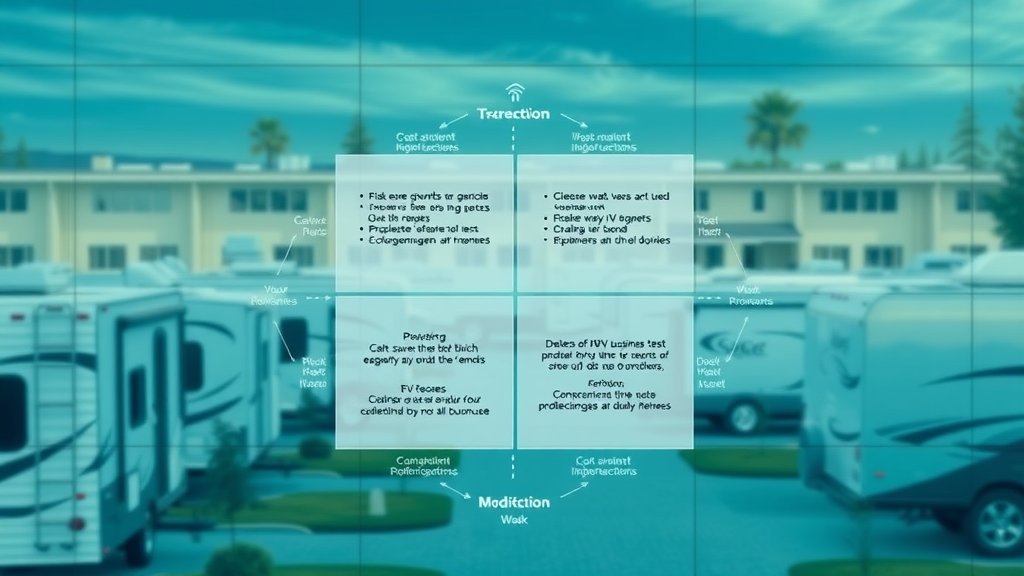
Image: Business matrix diagram visualizing growth elements in the RV park industry, blue-green palette.
Emerging Trends in RV Parks and Campgrounds
- Growth of luxury RV resorts with upscale amenities: High-end resorts provide premium services such as swimming pools, tiki bars, and oversized lots, appealing to affluent clientele.
- Expansion of glamping and alternative accommodations: Increasingly popular glamping sites and unique lodging cater to a broader segment, including those new to camping.
- Increasing focus on community and connectivity: Social spaces and reliable connectivity services promote interaction and meet the modern traveler’s needs.

Image: Luxury RV resort pool at sunset with guests socializing, photorealistic, golden hour lighting.
Adapting to Changing Customer Preferences
- Appealing to affluent RV owners seeking premium experiences: Enhancing amenities and personalized services attracts high-end customers who desire exclusivity and comfort.
- Attracting younger campers with tech-friendly features: By offering Wi-Fi, app-based booking, and eco-conscious initiatives, parks satisfy tech-savvy younger generations.
- Balancing rustic charm with modern conveniences: Successful parks merge traditional camping aesthetics with contemporary comforts to provide an authentic yet convenient experience.

Image: Young adults enjoying a trendy RV campsite, cozy night setting with string lights and technology use.
People Also Ask: FAQs About the Future of RV Parks
- Q: What is the future of RV parks? A: The future of RV parks involves embracing innovation such as glamping, advanced technology, and remote work amenities to meet evolving traveler preferences and economic cycles.
- Q: What is the 10 year rule for RV parks? A: This rule generally refers to an investment horizon where RV parks often realize significant appreciation or return after a decade of operation, influenced by improvements and market growth.
- Q: What is the 3 3 3 rule for RV camping? A: A guideline for campers suggesting balanced planning: 3 days of travel, 3 days of stay, and 3 key amenities to focus on for an enjoyable experience.
- Q: What is the future of the RV industry? A: The RV industry is expected to sustain growth fueled by lifestyle changes, innovation in accommodations, and expanding user demographics including millennials and remote workers.
Key Takeaways on the Future of RV Parks
- The future of RV parks is shaped by innovation, advanced technology, and evolving customer needs.
- Remote work trends and glamping are significant growth drivers within the industry.
- Effective marketing strategies and modern reservation systems are critical to maximizing park value and occupancy.
- Collaborative broker networks and personalized service enhance sales success and client satisfaction.
Conclusion
The future of RV parks is bright and dynamic, offering abundant opportunities for owners and investors who embrace change and innovate strategically. As Marie Hansen of RVParkSales.com emphasizes, " Understanding your market and leveraging technology can transform your park’s potential and profitability. " By staying attuned to economic cycles and shifting customer preferences, RV parks can thrive and remain valuable community hubs well into the future. To explore further and prepare your RV park for success, visit www.RVParkSales.com .
Call To Action
You can visit Marie at www.RVParkSales.com to learn more about the value matrix and how to maximize your RV park’s potential.
 Add Row
Add Row  Add
Add 
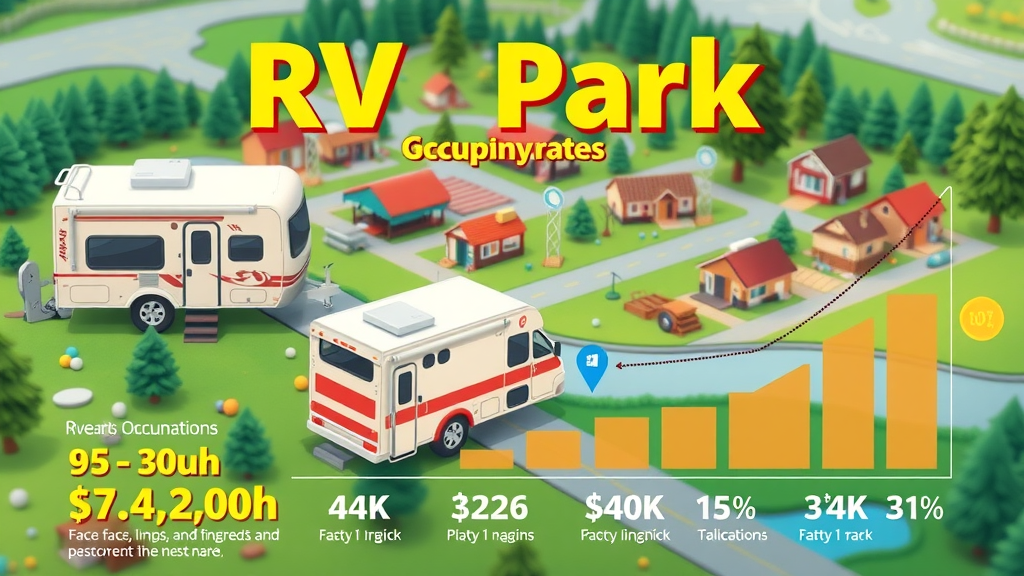
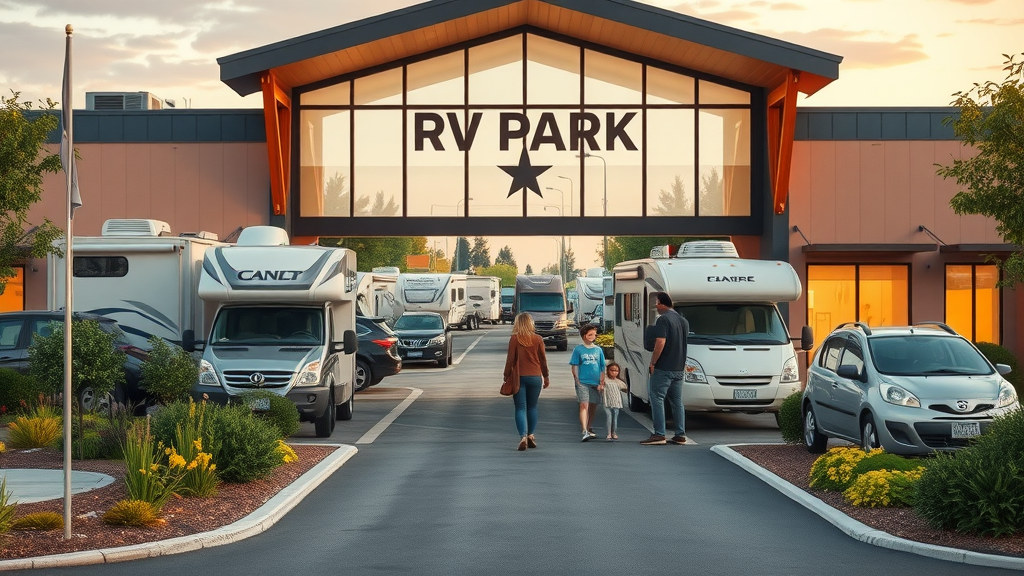
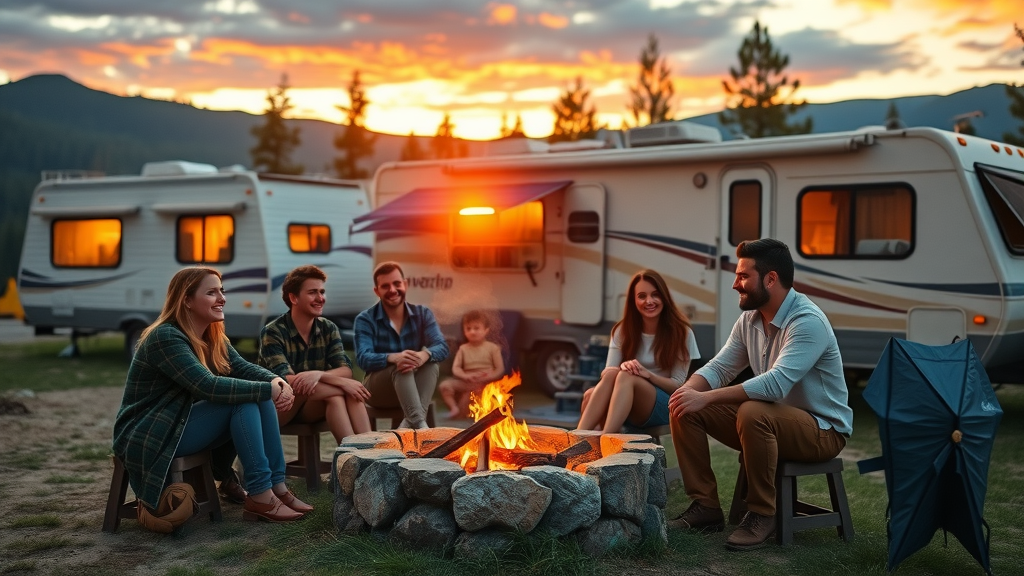
 Add Row
Add Row  Add
Add 
Write A Comment